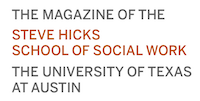The 2017 Steve Hicks Scholars
Steve Hicks’s generous gift will create a permanent endowment to provide financial support to master’s level students. An endowed gift is invested, never spent. Each year a distribution — like dividends on a mutual fund account — will be made to fund Steve Hicks Scholars. These scholars will have almost all of their tuition covered for the two years of the master’s program.
Once the process of endowing the gift is finished, by fall 2025, we will be able to offer Steve Hicks scholarships to more than one third of the students in the master’s program.
For now, we want to introduce you to the first cohort of Steve Hicks Scholars that we were able to fund in fall 2017, only a few weeks after the gift came in.
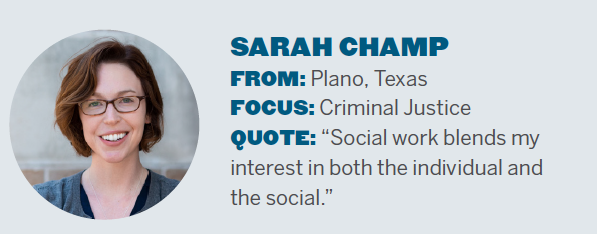
As a double major in psychology and gender studies at Middlebury College, Sarah Champ often found herself in a bind. She enjoyed her psychology classes but could not stop thinking about the social factors that also affect individuals’ minds and behaviors. She relished her gender studies classes, but felt that each person’s individuality was cast aside for the benefit of all-encompassing categories.
It took a social worker to get her out of that bind. She was the mother of one of Champ’s best friends, and explained how social work’s person-in-environment perspective takes into account both the individual and the social. She also told Champ that, of all the mental health professions, social work is the only one with a commitment to social justice as a core value. With that, Champ was won over. After she graduates, she hopes to stay in Texas and help make reproductive health policy better.
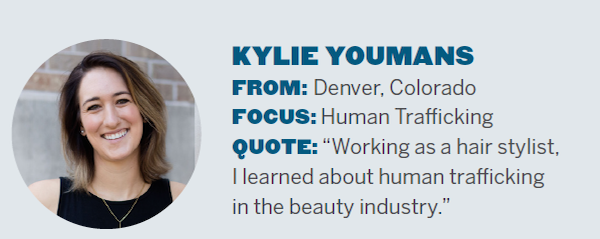
Kylie Youmans always loved to do hair. She also knew that she wanted to go to graduate school for counseling, but after getting her BA in psychology she took a break and got her hair-stylist license. For two years, she worked at the Paul Mitchell School in her native Denver, and she felt that she was practicing counseling skills —listening to her clients’ stories while cutting their hair, and helping them work through their life issues.
Youmans also learned that the beauty industry is one of the main funnels of human trafficking in the United States — think for example of sex trade networks operating under the façade of spa services. After she gets her master’s, she wants to help victims of human trafficking recover. Some day, Youmans also hopes to combine her love for hair styling and counseling in “hair-apy” sessions. She says that when she mentions the idea to someone, they ask her to please sign them up.
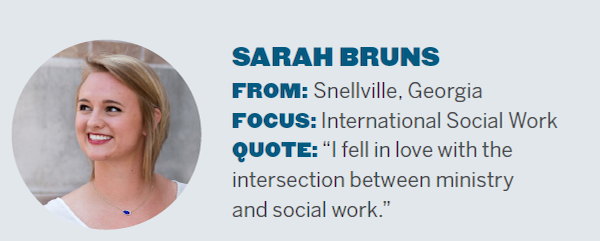
Three years into the future, Sarah Bruns wants to be living in a developing country, working with a ministry or a church in helping meet the basic needs of a community.
Bruns discovered the intersection of social work and ministry during her senior year at Georgia Southern University, where she was majoring in child and family development. She was working as a community liaison in a clinic that provided medical services to uninsured individuals. Through her church, Bruns was also working in a transitional housing program for people experiencing homelessness. She realized that social work and ministry share the same values and advocate for people who are marginalized. These experiences also cemented her passion for building relationships with clients. Her favorite part of the process, Bruns says, is discovering the individuality of each case and seeing each client as a whole person deserving of help no matter who they are or what circumstances they are in.

In 2016, during her senior year as a communications sciences and disorders major on the Forty Acres, Amber Perry was interning at the Austin Speech Lab. She was considering medical school, but her supervisor suggested that she looked into social work after noticing that, when working on drills with patients, Perry was always interested in learning about how their speech impediment affected their everyday lives and social relations.
She now wants to explore geriatric social work, as many of the clients she worked with at the speech lab were older adults who had suffered strokes. She noticed that it was easy for them to become socially isolated and be prone to conditions such as anxiety and depression. But most of all, Perry was touched by their work ethic and positive attitude in the midst of an oftentimes frustratingly slow struggle to recover the ability to communicate.
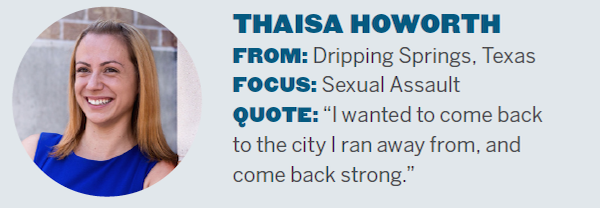
In 2013, Thaisa Howorth moved to South Korea to teach English. She had just graduated from UT Austin with a love for making documentaries and a major in radio, television and film. But most importantly, she was recovering from a sexual assault and felt that she needed to be as far away as possible from Austin.
Howorth was assigned to the city of Anyang, a name that she found auspicious because it happens to signify a heavenly land where joy and freedom overflow. Of her many experiences in South Korea, Howorth cherishes her discovery of running and the support she found in the members of the Seoul Flyers, a running club she joined. A friend from the club told her about social work, and eventually Howorth made the decision to come back to UT Austin for her master’s. She wants to help sexual assault survivors recover, and is already thinking about how to bring her documentary-making skills into the process.
